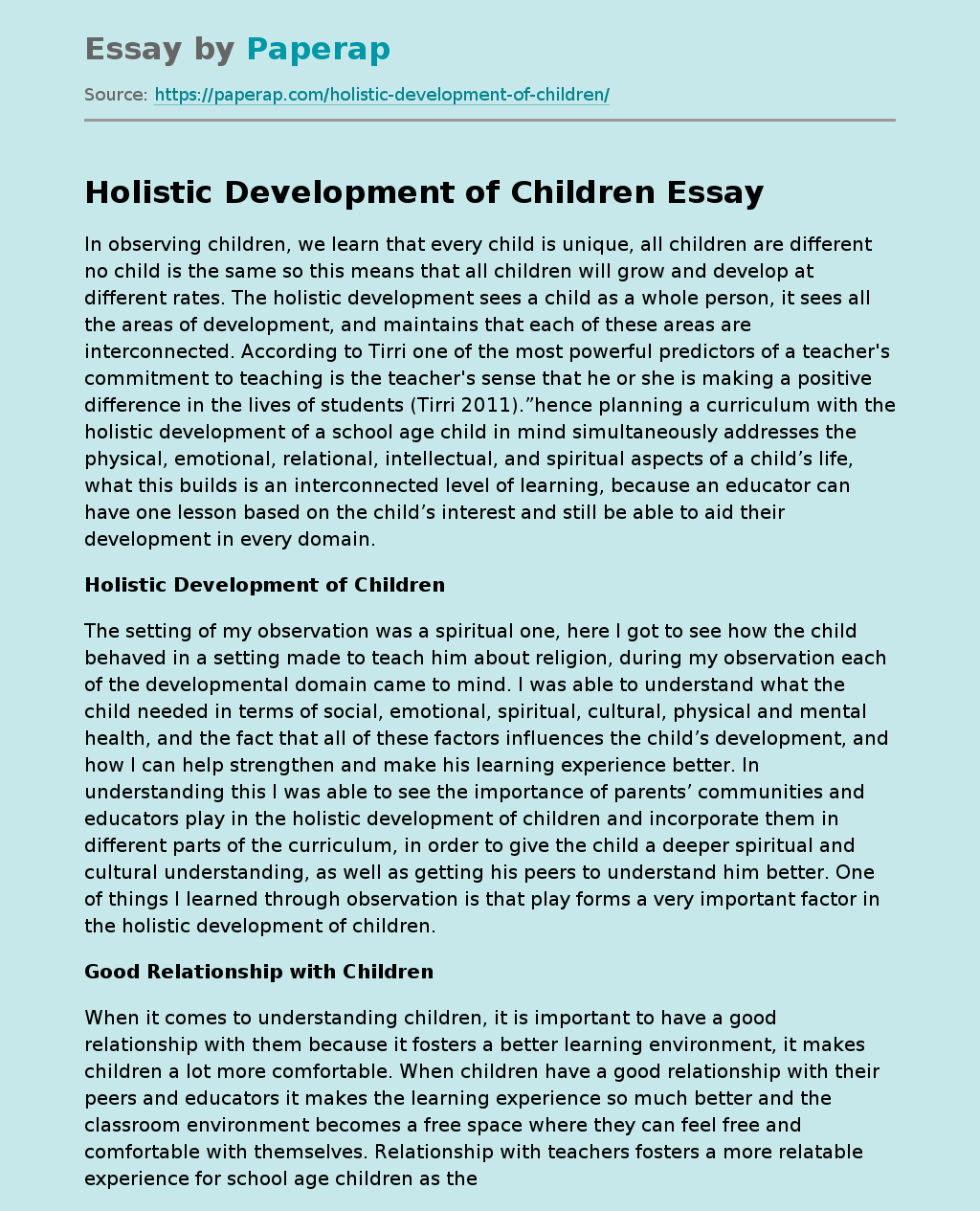Holistic Development of Children
In observing children, we learn that every child is unique, all children are different no child is the same so this means that all children will grow and develop at different rates. The holistic development sees a child as a whole person, it sees all the areas of development, and maintains that each of these areas are interconnected. According to Tirri one of the most powerful predictors of a teacher’s commitment to teaching is the teacher’s sense that he or she is making a positive difference in the lives of students (Tirri 2011).
”hence planning a curriculum with the holistic development of a school age child in mind simultaneously addresses the physical, emotional, relational, intellectual, and spiritual aspects of a child’s life, what this builds is an interconnected level of learning, because an educator can have one lesson based on the child’s interest and still be able to aid their development in every domain.
Holistic Development of Children
The setting of my observation was a spiritual one, here I got to see how the child behaved in a setting made to teach him about religion, during my observation each of the developmental domain came to mind.
I was able to understand what the child needed in terms of social, emotional, spiritual, cultural, physical and mental health, and the fact that all of these factors influences the child’s development, and how I can help strengthen and make his learning experience better. In understanding this I was able to see the importance of parents’ communities and educators play in the holistic development of children and incorporate them in different parts of the curriculum, in order to give the child a deeper spiritual and cultural understanding, as well as getting his peers to understand him better.
One of things I learned through observation is that play forms a very important factor in the holistic development of children.
Good Relationship with Children
When it comes to understanding children, it is important to have a good relationship with them because it fosters a better learning environment, it makes children a lot more comfortable. When children have a good relationship with their peers and educators it makes the learning experience so much better and the classroom environment becomes a free space where they can feel free and comfortable with themselves. Relationship with teachers fosters a more relatable experience for school age children as they are able to build a trusting and respecting connection with their teacher. According to pinata et al (2002) A teacher’s sensitive behavior toward a child -responsiveness to the students’ cues for help- can reduce the occurrence of problem behavior in the classroom among children likely to demonstrate such behavior.
An educator and a child having a relationship becomes an important factor to learning because, learning becomes something easy for them as the teacher is seen as a peer they can go to as a resource for help and the classroom the becomes a space where they are able to interact and socialize with one another. Based on Vaclavik et al studies, they stated “Recent mentoring studies have revealed that simply the presence of natural mentors is insufficient in promoting positive youth outcomes; high-quality, close relationships are necessary. For instance, in their sample of African American adolescents, they found that more connected (e.g., closer, more involved) mentoring relationships yielded greater academic engagement compared to not having mentoring relationships Valacvik (2017).” Building strong relationships can help children deal with any issues they are having both mentally and emotionally, it also increases their academic abilities, because they constantly have supports that motivate them. Hence the classroom environment becomes a space that’s not just for learning but to also relax and gain a new experience and new understanding of things.
Dealing with School-Age Children
Additionally, in order to combat behavior challenges with school agers Domitrovich et al (2016) suggest that teachers who promote positive student interactions and prevent problematic behavior develop high-quality relationships with students and create a classroom climate that maximizes academic time and facilitates learning engagement .” hence social learning and building a curriculum that fosters a less hostile and comfortable atmosphere is one of the many ways researchers suggest educators combat misbehavior with. Another preventative method of dealing with school agers with behavior challenges is interacting with listening to them when they are opening up to educators not just for listening but also for comprehension, when educators listen to comprehend how a child is feeling and communicates that they understand everything that the child has said.It leaves the child free and more open to teachers, they would in turn see the classroom, their peers and teachers as a support system. All in all, then educators are emotionally available and create an environment where kids can freely open, behavioral challenges are less likely to appear.
Since a building a strong relationship is important in combating behavioral challenges and fostering a healthy classroom environment, it is also important to know that educators need to asses themselves in a before and after school program. Based on Domitrovich et al (2016 ) studies “The relationship that teachers share with their students (i.e., their relatedness to students)
Holistic Development of Children. (2021, Nov 11). Retrieved from https://paperap.com/holistic-development-of-children/

